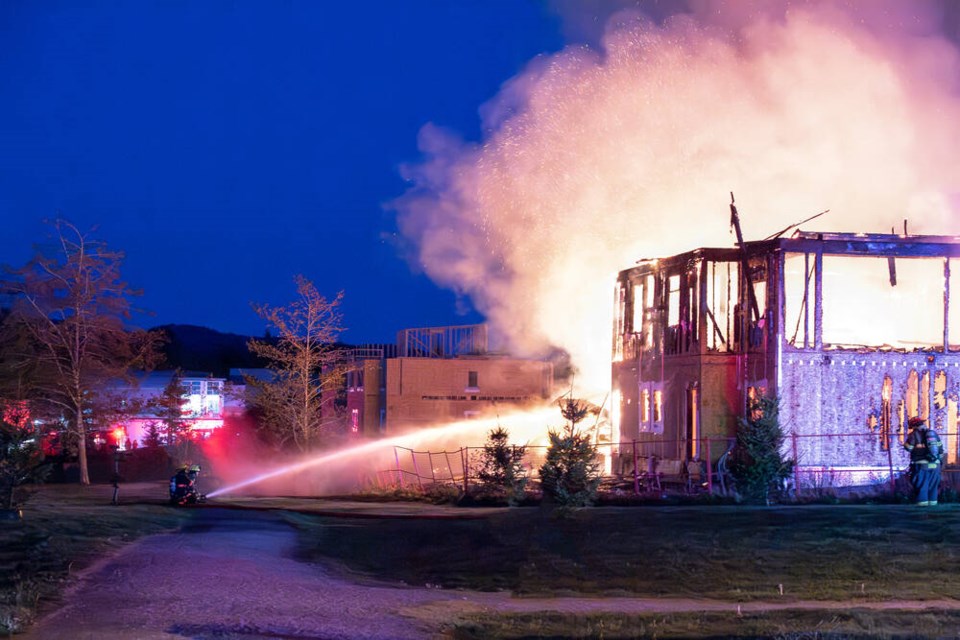A commentary by the vice-chair of Grumpy Taxpayer$ of Greater Victoria, a non-partisan citizens advocacy group for municipal taxpayers.
Our community was reminded of the benefits of working together to provide the highest possible fire safety standards after the recent inferno in Sooke.
Quick action by Sooke firefighters and their colleagues at Otter Point, Metchosin, and East Sooke, saved a Sooke neighbourhood from destruction. Four partially constructed homes were engulfed, the heat broke windows and melted soffits in nearby homes and terrified fleeing homeowners.
The near-catastrophe highlights the ongoing debate about creating an unified Capital Region Fire Services consisting of Victoria, Saanich, Esquimalt and Oak Bay.
There are compelling reasons, and these days the rationale is even more convincing.
Hard-pressed taxpayers are demanding efficiencies be found, service improved and the tax load be moderated.
This year there are hefty property tax increases, never mind the various utility fees and pretty much everything else. Taxpayers face hikes in Victoria (6.15 per cent), Saanich (7.19 per cent), Esquimalt (7.41 per cent) and Oak Bay (9.2 per cent).
It may also be a good time to integrate services considering several municipalities are either paying for, building, or planning pricey new fire halls.
Victoria has just opened a new $34-million main firehall and emergency operations centre in an earthquake resistant building. In Saanich, Fire Hall No. 2 costs rocketed from $26.6 to $44.6 million, is expected to begin construction in early 2023 and take about 18 months. Esquimalt is reconsidering the budget for its new public safety building after it rose by nearly 50 per cent to $62.2 million in two years.
Saanch Coun. Colin Plant, who chairs the Capital Regional District board, is championing the idea of consolidating the four core fire services.
There’s a rationale for consolidating services.
There would be one command structure for a core area to service 260,000 people. Cross-border complexities create unnecessary hurdles. So, erasing those boundaries for fire suppression would simplify and potentially speed up dispatch times.
Response times for fire trucks (and other emergency vehicles) surely haven’t been helped either with the recent proliferation of traffic calming measures, speed bumps, curb extensions, medians and kilometres of bike lanes.
In some instances, response times for fires are being delayed with the dramatic increase in drug overdoses.
Current fragmented communications with two separate dispatch/call centres take 911 fire calls, dispatch the four fire services and provide support to crews on site.
Surrey provides dispatch for Victoria and Esquimalt, while Saanich dispatches Oak Bay and Saanich. This complicates initiating mutual aid.
It also complicates dispatching the nearest fire hall, when the nearest hall may be located in the area of the other dispatch centre. For example, a fire call from the eastern portion of Victoria (dispatched by Surrey) which is closer to the Oak Bay Hall (which is dispatched by Saanich). A common dispatch centre would dispatch the nearest hall immediately based on computer aided dispatch recommendations.
All four departments have professional (career) firefighters. But each department requires at least one other department to provide mutual aid during major fire events to meet 91原创 Level of Service Standards.
Budget considerations around cross border fee-for-service, where an assisting fire department charges for its mutual aid service exceeding one hour, can complicate a department’s decision to ask for assistance.
Within a merged fire department, firefighters and apparatus would be deployed as needed, without cumbersome mutual aid agreements.
Rather than the current four, there would be one human resources department, training branch, and emergency planning group.
Disaster response planning would be simplified and more effective. Rather than having four separate emergency disaster plans, one plan would exist to coordinate resources more effectively when disasters occur.
Perhaps an urban heavy rescue team could be formed like Burnaby Fire Departments, which has participated in several real earthquake rescue missions. This gave Burnaby’s team “real world” experience (as well as humanitarian aid) with little municipal cost.
Of course there would be challenges in this major multi-year undertaking.
It would require the cooperation of the four municipalities, their fire departments and the four IAFF Union locals that represent the firefighters.
An administrative structure and oversight body would be required to approve budgets, provide accountability, and to fulfill the role of ‘employer.’
A consultant would be required to study all aspects of a merger, which would have to include discussions with key municipal administrators, fire department management and IAFF Locals. A cost-sharing formula acceptable to all and perhaps similar to that for the regional library is required.
Perhaps an opportunity already exists.
The current Citizens’ Assembly Committee could order a separate study to flesh out a model for governance, funding and operations for merging fire services in Saanich and Victoria.
Rest assured there will be more fires in the region, hopefully not with 100-foot flames shooting into the sky as was the case in the Sooke blaze.
Let’s roll up our sleeves, set aside local parochial politics, and improve our fire safety in the heavily populated core municipalities.
When life and property are at stake, seconds matter.
>>> To comment on this article, write a letter to the editor: [email protected]



